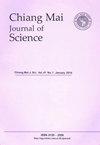Biosurfactant-Producing Bacteria and Microbial Analysis in Mae Soon Reservoir, Fang Oil Field, Chiang Mai, Thailand
IF 0.8
4区 综合性期刊
Q3 MULTIDISCIPLINARY SCIENCES
引用次数: 0
Abstract
Microbial Enhanced Oil Recovery (MEOR) is an effective alternative method for oil recovery in reservoirs using microorganisms or their secondary metabolites. This research aimed to evaluate the indigenous bacteria from Mae Soon reservoir by culture-dependent and culture-independent methods and to investigate the potential of biosurfactant-producing bacteria using a drop-collapsed assay. Indigenous bacteria were isolated from the oil sands of the reserved core of Mae Soon reservoir using fi ve different media (nutrient, Luria-Bertani, mineral salt, tryptic soy, and peptone yeast extract). Fifty-four facultative anaerobic bacterial isolates were obtained. Seven isolates showed their potential as biosurfactant producers in the drop-collapse assay. Based on 16S rRNA gene analysis, six of the biosurfactant-producing bacterial isolates belonged to the species Bacillus licheniformis and one belonged to the species B. subtilis. The biosurfactant producers and microbial community in the oil sands were determined using Denaturing Gradient Gel Electrophoresis (DGGE). Interestingly, DGGE bands corresponding to bacteria belonging to the genus Geobacillus sp. were detected. Overall, the results obtained from this work showed that indigenous bacteria in Mae Soon reservoir oil well were prospective for use in MEOR.泰国清迈芳油田Mae Soon油藏生物表面活性剂产菌及微生物分析
微生物提高采油(MEOR)是利用微生物或其次生代谢产物进行油藏采油的一种有效替代方法。本研究旨在通过培养依赖型和非培养依赖型两种方法对Mae Soon水库中的本地细菌进行评价,并利用滴落法研究产生生物表面活性剂的细菌的潜力。采用5种培养基(营养物、Luria-Bertani、无矿盐、色氨酸大豆和蛋白胨酵母提取物)从美顺储层保留岩心的油砂中分离出原生细菌。分离得到54株兼性厌氧细菌。7株分离菌在滴崩试验中显示出作为生物表面活性剂的生产潜力。根据16S rRNA基因分析,6株产生物表面活性剂的分离菌属于地衣芽孢杆菌,1株属于枯草芽孢杆菌。采用变性梯度凝胶电泳(DGGE)技术对油砂中生物表面活性剂的生成物和微生物群落进行了测定。有趣的是,检测到Geobacillus sp.属细菌对应的DGGE条带。综上所述,本研究结果表明,Mae Soon油藏油井中的原生细菌具有较好的MEOR应用前景。
本文章由计算机程序翻译,如有差异,请以英文原文为准。
求助全文
约1分钟内获得全文
求助全文
来源期刊

Chiang Mai Journal of Science
MULTIDISCIPLINARY SCIENCES-
CiteScore
1.00
自引率
25.00%
发文量
103
审稿时长
3 months
期刊介绍:
The Chiang Mai Journal of Science is an international English language peer-reviewed journal which is published in open access electronic format 6 times a year in January, March, May, July, September and November by the Faculty of Science, Chiang Mai University. Manuscripts in most areas of science are welcomed except in areas such as agriculture, engineering and medical science which are outside the scope of the Journal. Currently, we focus on manuscripts in biology, chemistry, physics, materials science and environmental science. Papers in mathematics statistics and computer science are also included but should be of an applied nature rather than purely theoretical. Manuscripts describing experiments on humans or animals are required to provide proof that all experiments have been carried out according to the ethical regulations of the respective institutional and/or governmental authorities and this should be clearly stated in the manuscript itself. The Editor reserves the right to reject manuscripts that fail to do so.
 求助内容:
求助内容: 应助结果提醒方式:
应助结果提醒方式:


